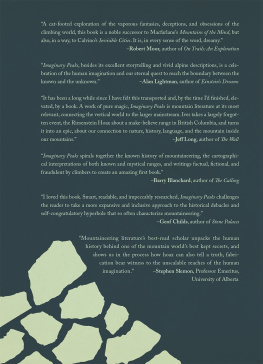SWITZERLAND
In the same series
AUSTRIA-HUNGARY
ENGLAND
FRANCE
ITALY
AT LES PLANS IN APRIL.
SWITZERLAND
BY
FRANK FOX
AUTHOR OF "RAMPARTS OF EMPIRE" "PEEPS AT THE BRITISH EMPIRE," "AUSTRALIA," AND "OCEANIA"
WITH 32 FULL-PAGE ILLUSTRATIONS IN COLOUR
LONDON
ADAM AND CHARLES BLACK
1914
PREFACE
In Switzerland, above all other lands of Europe, is the greatness of Nature manifest. But not even the Alps can overshadow the story of her gallant people. The Swiss are more interesting even than Switzerland. In this volume thereforea volume intended to give the reader who cannot hope to see Switzerland some idea of its character, as well as to guide those who hope or intend to undertake a Swiss touran attempt has been made to give a brief sketch of the origins and achievements of the Swiss people, as well as to describe the natural beauties of the country. To a very remarkable extent the history of Switzerland has affected the general current of European history, partly through the courage of the mercenary soldiers that the Alpine communities sent abroad in olden times, partly because always Switzerland has provided a house of refuge for political exiles from other countries. The deeds of her people cannot but be interesting in every land where European civilisation rules. They have the interest not only of their essential heroism but of their near relation to the development of other countries.
No exhaustive record has been attempted. This volume cannot, for the serious student, serve either as a history of Switzerland, as a description of the Swiss Alps, or as a record of those interesting literary and scientific coteries which grew up beside the Swiss lakes. Its purpose rather is to give to the reader who cannot devote a special interest to the country some fairly adequate idea of its history, its character, and institutions. The illustrations have been selected to give as comprehensive an impression as possible of the various beauties of Swiss scenery.
FRANK FOX.
CHAPTER I
THE SPIRIT OF THE MOUNTAINS
The Swiss as a people often suffer in the judgment of the tourist by failure to live up to their reputation as a "mountain people"to a glorious "Alpine" character.
The dweller by the shores of the sea or by the riverine plains, setting his feet along a mountain path towards the peaks which go up to meet the sky, ordinarily feels a sense of joy and freedom as he climbs to the higher air. He seems to shake off shackles from his mind and to enter into an enjoyment of life which is less earthly and nearer to the spiritual. His imagination is impressed with the thought that truly he is mounting towards the stars. There is, to aid imagination, a definite corporal effect due to a slight change in the nature of the air. A quickening pulse seems to tell of the heart becoming more generous in response to the spirit of the mountains.
From this feeling of exhilaration of the mind and the body, which comes when ascending, after a long stay on the plains, to a mountain height, arises an almost universal belief in human thought that there is some special spiritual and ennobling influence in the mountains of the earth. Poets have sung of it again and again: philosophers have admitted to it with a more discreet but with a no less certain rapture. Many scientists have explained it with as ingenious explanations as were offered by those learned men who were set by a waggish French king to explain to him why it was that: given two dishes, each full to the brim of water, and two fish of equal size, but one dead and the other alive: and allowed that the live fish is put in the one full dish and the dead fish in the other full dish with equal care: then, whilst the water of the dish in which the dead fish is placed will overflow at once, the water of the dish in which the live fish is placed will not overflow.
That king's merry jest on his men of learning who set out to find a reason for a "fact" before finding out whether it was a fact, was neatly countered, if my memory of the story be correct, by one courtier-scientist who ingeniously pleaded that what His Majesty said on any matter must, by all loyal subjects, be accepted as a fact, and in truth did, to the loyal mind, become a fact, no unworthy suspicions being harboured that a king of France could not make, change, or annul a natural law just as well as any other law.
In truth, though, the idea that dwelling on a mountain-top has a strengthening effect on the human frame and an ennobling influence on the human character is mostly fallacious. It may be "explained" but not proved. Those who hold it, if questioned in the Socratic manner to give proofs in the first place of the existence of the ennobling influence they believe in, could well plead a general human consent on the pointa universal belief. But they would, I think, be hard put to it, to offer any more real proof than the statements of some poet, or of some philosopher, or the explanation of some scientist who had explained a circumstance without first proving it.
Let there be imagined a cross-examination on the point by some modern follower of Socrates' methods:
S. You say that the Swiss people are a noble race because they are a mountain race. Will you, if you have time, explain to me why that is so? I am very anxious to know the true reason why the fact of living on a mountain should have this fine effect on the human character.








